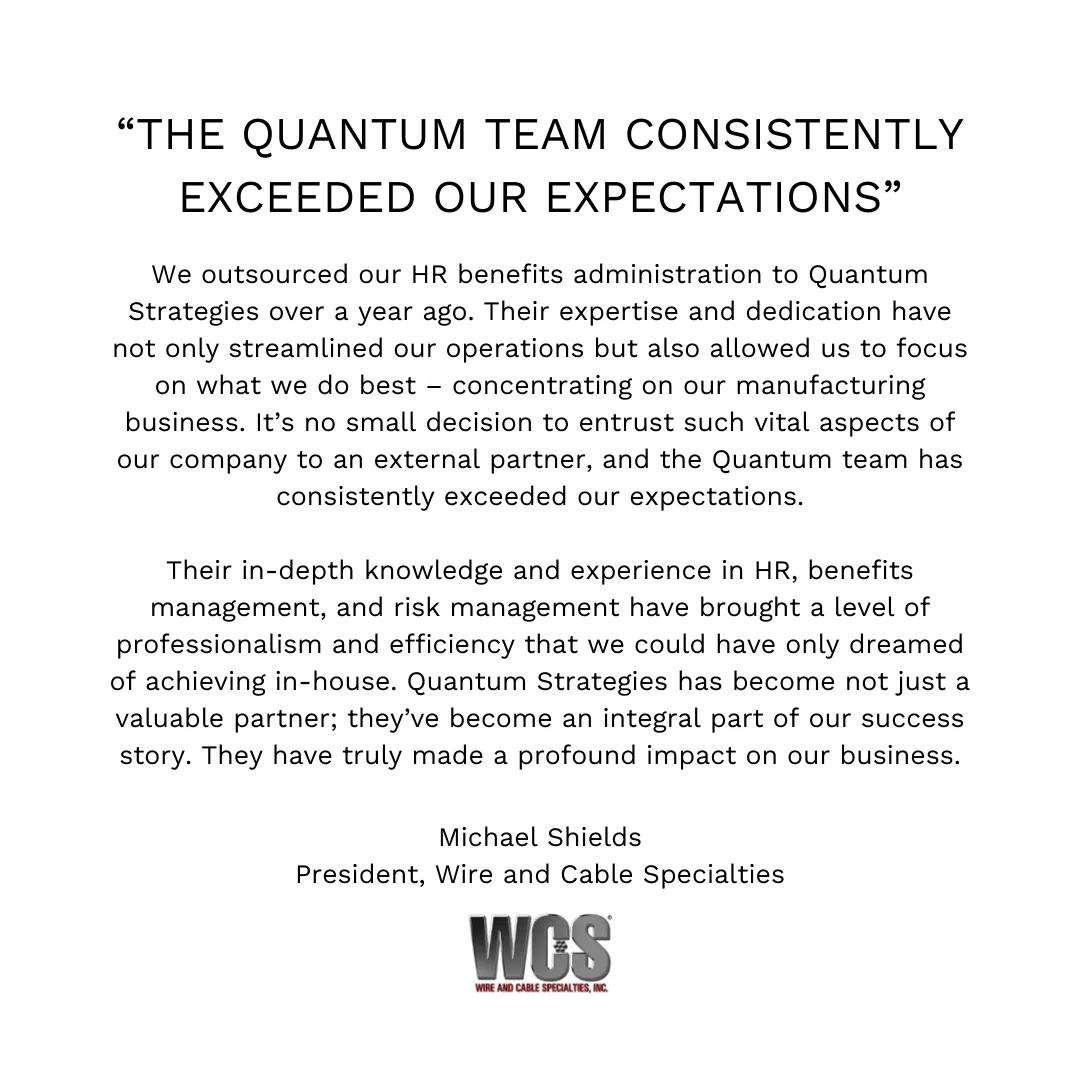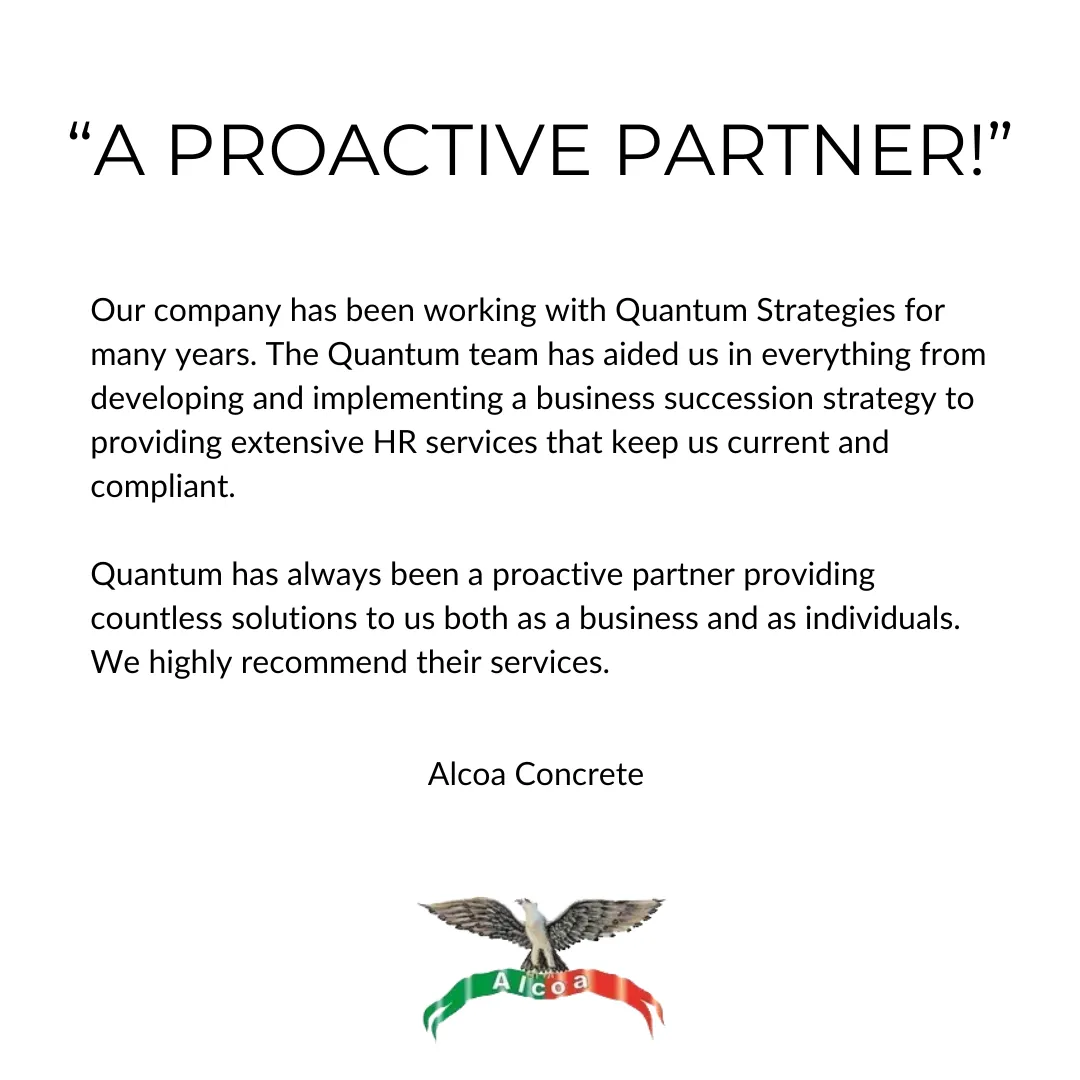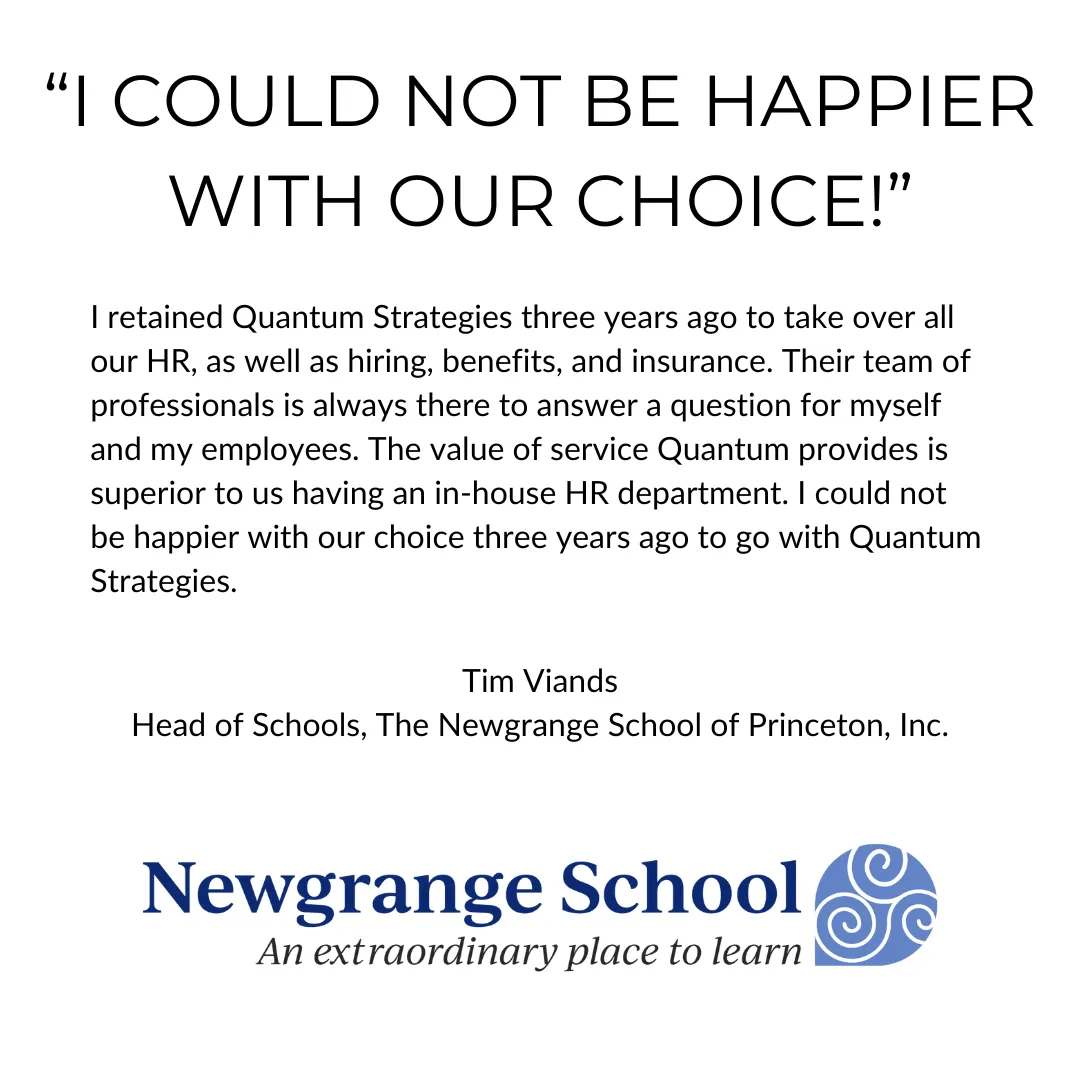Tailored HR Solutions as Unique as Your Business
Expert consulting and service to elevate your HR from a headache to a value driver.
Does Your HR Function Make the Grade?
Take our 5-minute quiz and evaluate the effectiveness of your HR function.

How We Help
We Focus on Your HR Needs,
So You Can Focus on Your Mission.
At Quantum Strategies, we understand that effective human resource management is the cornerstone of every successful business, regardless of size. Our mission is to provide tailored HR solutions that align perfectly with your unique business needs and growth stage.
Our Services
Navigating Change with Confidence: Quantum Expert HR Solutions
From Policy Assistance to Leadership Succession Planning, Quantum Strategies is Your Ultimate HR Resource to Solve Your Business Challenges.
HR Operational
Assessments
Unlock the full potential of your HR department. Our collaborative approach brings clarity and efficiency to your HR operations, providing a thorough analysis of your department's structure, costs, effectiveness, and needs.
Comprehensive Analysis: Detailed evaluation of your organization, workgroups, and individual roles for optimized efficiency.
Objective Insights: Receive a clear blueprint highlighting your HR department's strengths, weaknesses, and gaps.
Strategic Recommendations: Actionable plans focusing on technology utilization, communication enhancement, and leveraging department strengths.
HR Consulting and Managed Services
Tailored to align with your unique needs, our HR consulting and managed services enhance operational efficiency and effectiveness, allowing you to focus on your core mission while we optimize your HR investment.
Expert Supplemental Support: Strengthen your existing HR team with specialized expertise to navigate complex HR landscapes.
Personalized, Agile Solutions: Customized services for organizations with or without HR teams, adaptable to your specific requirements.
Goal-Oriented, Clear Communication: Delivering precise, actionable strategies that align with your organization’s goals and ensure successful execution.
Custom HRIS Design and Integration
Revolutionize your HR data management. Our team will evaluate your current human resources technology stack, offer recommendations, and then integrate your new and existing systems with our cutting-edge technology, ensuring seamless data flow and optimized operational efficiency.
Seamless Integration: Connect legacy systems with modern platforms for streamlined data management.
Tailored Design: Custom HRIS solutions uniquely crafted to meet your specific business needs.
Advanced Analytics: Leverage data-driven insights for strategic decision-making and operational excellence.
“Successfully steering through the specialized HR challenges within organizations of all kinds demands expert understanding, strategic planning, and precise implementation. With comprehensive knowledge of these challenges and the right solutions, your business can stay focused and successful in their vital missions.”
William J. Rizzo

Who we Are.
We Focus on Your HR Needs,
So You Can Focus on Your Mission.
At Quantum Strategies, we recognize that proficient management of human resources is fundamental to the success of any enterprise, irrespective of its scale. Our objective is to deliver customized human resource solutions that are in perfect harmony with your distinct business requirements and developmental phase.
Constant Improvement
Commitment to Customers
High Level Of Knowledge
Best Service You Can Get

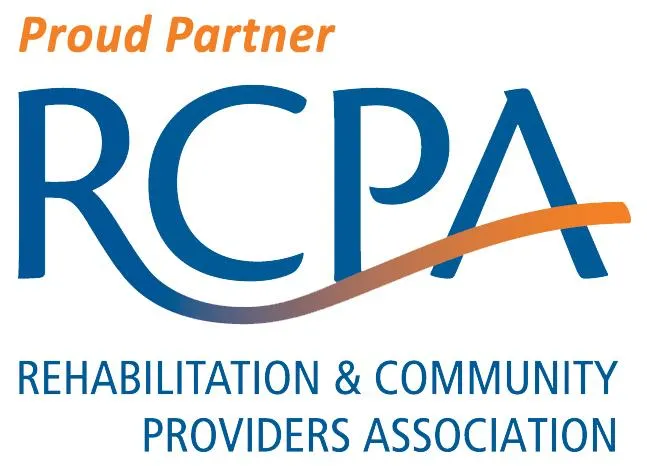
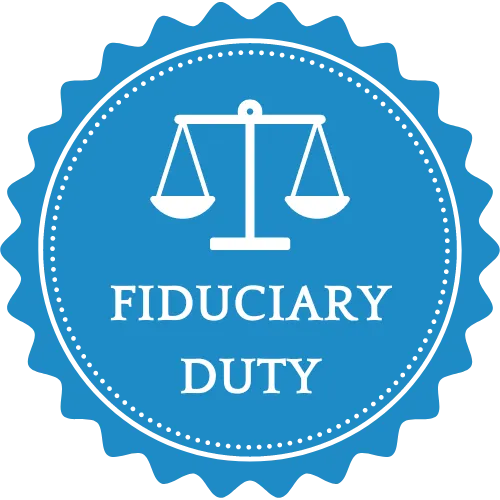
Why Choose Us
A True Partner to Solve Your Most Complex HR Challenges.
Empowering HR Innovation and Compliance
Commitment to 100% Client Satisfaction
People-First Approach

Peace of Mind:
Handle ongoing compliance with ease

Employee Satisfaction:
Build a positive workplace with engaged employees

Strategic Confidence:
Drive strategy with advanced analytics

Leadership Development:
Equip your team with the tools to lead

2,245 +
Happy Clients

25 +
Years Of Experience

120 +
Professional Team
Testimonials
The Quantum Commitment - 100% CLIENT SATISFACTION!
At Quantum, we understand that your satisfaction matters most, and The Quantum Commitment is our way of putting that understanding into action. Experience the difference with a team that is dedicated to making your satisfaction the cornerstone of our service. Because when you choose Quantum, you choose excellence, reliability, and a commitment to exceeding your expectations every time.
Our Resources
Unveiling Proven Strategies and Insights.
Discover actionable tips, expert advice, and industry insights to fuel your journey towards success.

Fostering a Psychologically Safe Workspace
As we navigate the complexities of the post-pandemic world, the importance of mental health in the workplace has surged to unprecedented levels. According to research from the
American Psychological Association, 81% of employees are now actively seeking workplaces prioritizing mental well-being.
Key Challenges Faced by Human Resources in Nonprofit Organizations
The nonprofit sector brings its own set of specialized difficulties, especially in the area of human resources (HR). Although these difficulties may share some common ground with those in the for-profit industry, they possess unique characteristics that require special attention from nonprofit leaders.
FOUND THESE HELPFUL?
Explore Additional Articles and Resources In Our Blog

Hire Smarter: How Skills-Based Hiring Closes Talent Gaps
Hire Smarter: How Skills-Based Hiring Closes Talent Gaps
Why Traditional Hiring No Longer Works
Key Differences Between Traditional and Skills-Based Hiring:
The Rise of Education Skepticism
1.Skills Based Hiring Addresses Skills Gaps
2. It Tackles Talent Shortages
How to Successfully Implement Skills-Based Hiring
1. Define the Skills That Matter
2. Use Assessments Early and Often
3. Rethink the “Ideal” Candidate
4. Complement Testing with Structured Interviews
Steps to Shift to a Skills-First Hiring Model
Step 1: Audit Your Workforce Skills
Step 3: Eliminate Unnecessary Barriers
Step 4: Build Better Hiring Infrastructure
Key Takeaways

In today’s business world, technology is evolving faster. This ever-changing landscape requires a higher level of flexibility in all corners of business, and hiring is no different. Job titles no longer capture the full scope of an employee’s potential and traditional hiring methods are quickly becoming outdated. Companies today face growing talent shortages, skill mismatches, and rising hiring costs, all while seeking better performance, faster onboarding, and more diverse capable teams. The solution to this problem is skills-based hiring; a transformative approach that prioritizes real-world competencies over credentials and resumes.
This blog will explore the difference between traditional and skills-first hiring, why the latter is becoming the more dominant strategy, the practical benefits it offers, and how to implement it successfully in your organization.
What is Traditional Hiring?
Traditional hiring is the conventional method of talent acquisition that relies heavily on a candidate’s formal credentials, such as educational background, work experience, Job titles and resumes and cover letters. It is credential focused and can be prone to unintentional bias towards certain groups. It’s also an unreliable predictor of success, often filtering out candidates with fewer traditional credentials who might have been a stronger fit for the role.
What Are Skills-Based Hiring?
Skills-based hiring is a more practical approach to hiring. It shifts the focus from formal qualifications to a candidate's proven abilities and competencies. This means assessing an applicant’s hard and soft skills through structured testing, real-world simulations, and behavioral evaluations rather than relying on job titles or paper accolades.
According to McKinsey, hiring for skills is five times more predictive of job performance than hiring based on education. As workplaces advance, new career opportunities continue to emerge quarter after quarter. Skills-based hiring is a data-backed approach that offers a powerful way to future-proof your workforce.
Why Traditional Hiring No Longer Works
As mentioned previously, the conventional resume-based hiring model often misses out on qualified candidates favoring a narrow demographic who could afford a traditional four-year degree and who followed a linear career path. Today’s workforce looks different with many self-taught professionals who are skilled through non-traditional programs. Employers and job seekers are beginning to question the value of a college degree. Only 18% of job postings in the U.S. now require a college degree. Employers are starting to recognize that skills are more important than education when it comes to predicting job success.
Key Differences Between Traditional and Skills-Based Hiring:

Skills-first hiring provides a level playing field and ensures you’re evaluating people based on relevant abilities, not outdated metrics.
The Rise of Education Skepticism
Confidence in education as a valuable investment is declining worldwide. In the US, only 22% of adults believe that a college degree is worthwhile if it requires debt. In Europe, graduates are turning to coding bootcamps or self-teaching to gain relevant experience. Many organizations are removing degree requirements altogether and offering free training for in-demand roles.
This educational shift fuels the rise of skills-first hiring. It validates candidates who have gained expertise through alternative paths—such as behavioral interviewing strategies—making hiring more inclusive and aligned with today’s learning trends. This shift can also make candidates with diverse learning experiences more successful in skills-based hiring situations, as they had more hands-on experience than their freshly graduated peers who may have less practical experience.
Why Skills-Based Hiring Works
1.Skills Based Hiring Addresses Skills Gaps
New industries are forming faster than schools can adapt. By the time a school has curated a curriculum, and four years pass until the first students graduate, the demand for the skill may have dwindled, and certainly companies would have sought alternative candidates who had acquired the skills in other ways. From AI prompt engineers to TikTok strategists, companies need candidates with highly specific, evolving skills. Skills-based hiring ensures that you are hiring people who are ready to contribute from day one.
2. It Tackles Talent Shortages
By widening your candidate pool beyond degree holders, you access a broader, more diverse set of applicants. Companies that drop degree requirements often see higher application rates and stronger matches. Sometimes the non-degree holding candidates end up being a better fit for the role and help keep it filled.
3. It Closes Opportunity Gaps
Traditional hiring methods can lock out millions of capable workers, keeping them trapped in a role or industry where their skills or aptitudes are wasted. By opening your hiring to candidates who acquired skills in non-traditional ways, you can give a chance to an employee who skills that transfer well into your area of commerce. In the U.S., 70 million adults are skilled through alternative routes. Focusing on skills first overcomes biases, and enables talent to be recognized for what it is, rather than for the packaging it comes in.
Proven Business Benefits
Higher Quality Hires:
78% of employers using skills assessments report better performance from new hires. These employees are more confident, productive, and motivated from the outset.
Lower Hiring Costs:
Time-consuming resume reviews and interviews are streamlined by objective assessments, reducing time-to-hire and cutting recruitment costs. If a candidate can demonstrate that they have the skills you need, they will move forward in the process, if not, they will be removed from consideration without deliberation.
Improved Retention:
Skills-matched employees are 9% more likely to stay longer. That’s less turnover, fewer hiring cycles, and greater team cohesion. Company culture plays a strong role in retention and team cohesion.
More Inclusive Workforces:
De-emphasizing traditional credentials leads to greater DEI. For example, Gen Z representation has been proven to increase tenfold when companies adopt skills-first methods.
Better Candidate Experience:
Modern applicants want efficient, fair hiring. When interactive assessments replace generic application steps, talent remains more engaged and is less likely to lose interest in the position.
How to Successfully Implement Skills-Based Hiring
It can be daunting at first when considering the move from traditional to skills-based hiring, but with some background analysis and identification of business needs, implementing skills-based hiring is manageable. This list highlights some of the key considerations prior to implementation and then provides a step-by-step guide on implementation.
1. Define the Skills That Matter
Start on a job-by-job basis. Conduct a job task analysis breaking down the role into essential competencies. What does success look like? What are the must-have skills vs. the nice-to-have skills?
2. Use Assessments Early and Often
Pre-employment tests, real-world tasks, and soft skill evaluations should be built into your hiring model. Use them as quality filters for high-volume roles and for deeper assessments later in the hiring funnel.
3. Rethink the “Ideal” Candidate
Don’t filter candidates based on their education. Focus on outcomes; can they meet the needs of your team and role? Challenge biases around “years of experience” and consider transferable capabilities.
4. Complement Testing with Structured Interviews
Skills tests are just the beginning. Use structured interviews to evaluate culture fit, communication, and long-term potential. Always align interviews with the competencies you’re testing for.

Steps to Shift to a Skills-First Hiring Model
Step 1: Audit Your Workforce Skills
This can help you understand the strengths and gaps across your team. Keep this information current to guide your hiring plans.
Step 2: Spot the Gaps
Use insights from skills data to pinpoint critical shortages. Build job descriptions and hiring criteria around what the role truly requires rather than what sounds good on paper.
Step 3: Eliminate Unnecessary Barriers
Review job listings to ensure inclusive language. Drop degree requirements unless they are essential. Consider remote workers, career changers, and internal mobility.
Step 4: Build Better Hiring Infrastructure
Invest in recruitment technology platforms that streamline testing and talent analytics. Housing these together will help to identify any biases that remain, as well as show if the more diverse talent pool provides a wider pool of suitable candidates. HR technology can enhance this process by promoting better hiring infrastructure. Ensure that recruiters and hiring managers are aligned on what “qualified” really means.
Skills vs. Experience: What Matters More?
While experience can bring valuable perspective, it doesn’t always translate into competence. Someone with five years in the wrong role may be less qualified than someone with one year of targeted experience and strong learning agility and aptitude for that role.
That’s why three-quarters of hiring managers say they’d prioritize candidates who score high on skills tests, even if they lack “enough” experience or formal education.
Rethink What “Qualified” Means
The workforce is evolving, and so should our hiring practices. If you’re still screening resumes for Ivy League credentials or exact job titles, you’re missing out on top performers who are ready to contribute now.
Skills-based hiring isn’t just a recruitment strategy, it’s a mindset shift. One that values learning, agility, and impact over paper qualifications. By embracing this shift, companies can attract stronger candidates, make smarter decisions, and build teams that are ready for the ever-changing future.
Are you ready to embrace skills-based hiring but not sure where to start? Let Quantum Strategies help you analyze your current hiring practices and implement a tailored, data-driven approach that puts real-world skills at the center. Contact us today to future-proof your talent strategy and build a stronger, more agile workforce.
Connect
Keep Up with Our Latest News and Insights
Subscribe to Quantum Strategies' latest updates and insights.
Office: Philadelphia, PA | Glen Mills, PA | Washington, DC
Call 610.624.1770
Email: info@QS2500.com
Site: www.QS2500.com

